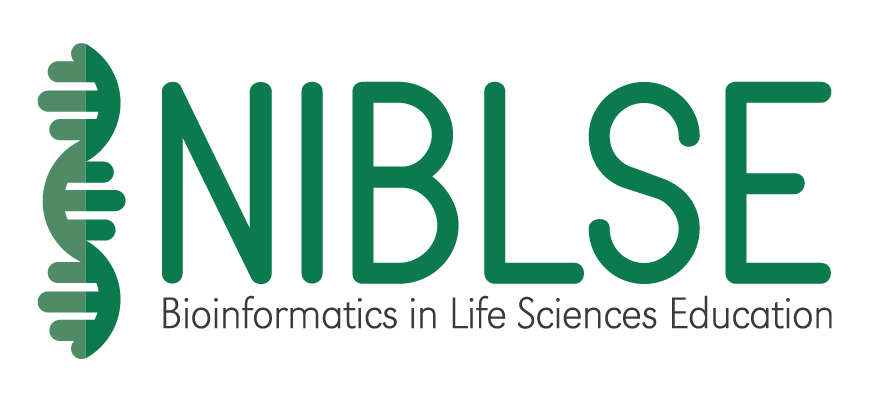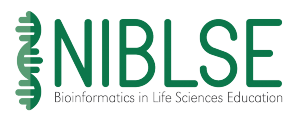NIBLSE Project Update
Summer 2018
Greetings NIBLSE Colleagues

On behalf of the NIBLSE leadership team it is a pleasure to send you this newsletter. NIBLSE members have been very busy since we last communicated formally. With this newsletter, we hope to summarize NIBLSE activities and encourage you to engage with the Network to accomplish our common goal of integrating bioinformatics education into life science curricula.
Project Update Contents
Updates
Thanking Mark Pauley
Many of you know that Mark Pauley, the founding PI of the Network, is now a program officer at NSF. When you see him, please thank Mark for his outstanding leadership. NIBLSE has accomplished much under Mark’s direction. He has established a foundation that virtually ensures continued success. Bill Tapprich (wtapprich@unomaha.edu) has taken the reigns. Please feel free to contact Bill with questions, comments and suggestions.
The NIBLSE Mission
The long-term goal of NIBLSE is to achieve the full integration of bioinformatics into undergraduate life sciences education. Specific activities are to:
- Establish a permanent network of investigators.
- Collaboratively identify, vet, and refine a set of bioinformatics core competencies
- Identify and vet assessment tools
- Organize and simplify the dissemination of materials
Establishing the Network
Official NIBLSE membership has grown from about 25 to about 80 in the last two years. Many members have been extremely active developing, vetting and integrating bioinformatics resources and exercises into life science curricula on their campuses. We seek to expand membership, capture integration stories, and engage members in the work of NIBLSE committees. If you are a NIBLES committee member, thank you for your service. If you seek to participate in the Resources Review Committee (RRC), Assessment and Validation Committee (AVC), or Barriers Group or Implementation Group contact Bill Tapprich (wtapprich@unomaha.edu).
Core Competencies
We proudly announce that the core competencies developed by NIBLSE members are now published in PLOS ONE. Many of you contributed to the development and to the manuscript. Thank you and congratulations.
Resource Collection
One of NIBLSE most important accomplishments is vetting and disseminating bioinformatics education resources. NIBLSE has partnered with QUBES to make a Resource Collection available to any interested educator. Using a unique incubator model, the Resources Review Committee (RRC) has worked with authors to develop resources that are ready for integration into courses. The RRC is actively seeking new resources and actively incubating submitted resources. Please contact Bill Morgan (WMORGAN@wooster.edu) if you are interested in participating in an incubator or if you have a resource to submit.
Assessment Instruments
One of the most challenging NIBLSE activities has been identifying and/or developing assessment instruments that address the core competencies. The Assessment Validation Committee (AVC) has worked tirelessly to make headway. As an emerging discipline, bioinformatics does not have a deep repository of assessments. NIBLSE seeks your help as we continue this important work.
Barriers to Integration
Analysis of the first NIBLSE survey revealed the existence of a number of barriers to integration. A preprint manuscript describing these barriers is posted on bioRxiv and a revised manuscript is ready for submission to Science. Many aspects of the barriers identified by NIBLSE need further investigation. NIBLSE will keep you updated about activities to learn more.
Implementation Group
Implementing bioinformatics resources into the classroom is the only way to accomplish the Network’s overall goal. NIBLSE recently established an implementation group charged with facilitating resource implementation. Please contact Eric Triplett (ewt@ufl.edu) if you wish to assist with the implementation effort.
Survey Coming
As part of our efforts to evaluate and improve NIBLSE, our external evaluators will deploy a short survey to the membership in the next week or so. Please watch for the survey.
ISCB/ISMB Education Community of Special Interest (COSI)
The 26th Annual Conference of Intelligent Systems for Molecular Biology (ISMB) included an education session (COSI) for the first time. Two members of the NIBLSE Leadership Team, Anne Rosenwald and Bill Morgan, presented outstanding talks describing NIBLSE. Their talks generated lively conversation.
